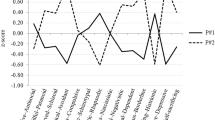Abstract
This study examined the effects of social standards on withdrawal from social interactions. Subjects with high or low perceptions of their social ability were provided with either a high, a low, or no social standard prior to an interaction. High-efficacy subjects persisted in the interaction when they could meet the standard and terminated the interaction when they could not. Low-efficacy subjects, on the other hand, withdrew from the interaction whether they matched the social standard or not. For high-efficacy individuals, these results were congruent with theories of social cognition, which emphasize discrepancies between standards and perceived ability. For low-efficacy individuals, a sense of goal attainment was not sufficient to overcome their habitual social withdrawal. Low-efficacy subjects recognized when they did or did not meet the social standard, but perceived themselves to lack control over the interaction. These subjects appeared to believe others held nonarticulated expectations for them that they were unable to meet.
Similar content being viewed by others
References
Alden, L., Teschuk, M., & Tee, K. (1990).Public self-consciousness and persistence in social interactions. Manuscript submitted for publication.
Amies, P. L., Gelder, M. G., & Shaw, P. M. (1983). Social phobia: A comparative clinical study.British Journal of Psychiatry, 142, 174–179.
Arkin, R. M. (1981). Self-presentation styles, In J. T. Tedeschi (ed.),Impression management theory in social psychological research (pp. 311–333). New York: Academic Press.
Arkin, R. M., Lake, E. A., & Baumgardner, A. H. (1986). Shyness and self-presentation. In W. H. Jones, J. M. Cheek, & S. R. Briggs (eds.),Shyness: Perspectives on research and treatment (pp. 189–203). New York: Plenum Press.
Bandura, A. (1986).Social foundations of thought and action: A social cognitive theory. Englewood Cliffs, NJ: Prentice-Hall.
Bandura, A. (1989). Self-efficacy conception of anxiety.Anxiety Research, 1, 77–98.
Bandura, A., & Cervone, D. (1986). Differential engagement of self-reactive influences in cognitive motivations.Organizational Behavior and Human Decision Processes, 38, 92–113.
Burgio, K. L., Merluzzi, T. V., & Pryor, J. B. (1986). Effects of performance expectancy and self-focused attention on social interaction.Journal of Personality and Social Psychology, 50, 1216–1221.
Buss, A. H. (1980).Self-consciousness and social anxiety. San Francisco: Freeman.
Cacioppo, J. T., Glass, C. R., & Merluzzi, T. V. (1979). Self-statements and self-evaluations: A cognitive-response analysis of heterosocial anxiety.Cognitive Therapy and Research, 3, 249–262.
Carver, C. S., & Scheier, M. F. (1986). Analyzing shyness: A specific application of broader self-regulatory principles. In W. H. Jones, J. M. Cheek, & S. R. Briggs (eds.),Shyness: Perspectives on research and treatment (pp. 173–185). New York: Plenum Press.
Clark, J. V., & Arkowitz, H. (1975). Social anxiety and self-evaluation of interpersonal performance.Psychological Reports, 36, 211–221.
Diener, E., & Srull, T. K. (1979). Self-awareness, psychological perspective, and self-reinforcement in relation to personal and social standards.Journal of Personality and Social Psychology, 37, 413–423.
Fenigstein, A., Scheier, M. F., & Buss, A. H. (1975). Public and private self-consciousness: Assessment and theory.Journal of Consulting and Clinical Psychology, 43, 522–527.
Froming, W. J., Walker, G. R., & Lopyan, K. J. (1982). Public and private self-awareness: When personal attitudes conflict with societal expectations.Journal of Experimental Social Psychology, 18, 476–487.
Latham, G. P., & Marshall, H. A. (1982). The effects of self-set, participatively set, and assigned goals on the performance of government employees.Personnel Psychology, ??5, 399–404.
Leary, M. R. (1982). Social anxiety. In L. Wheeler (ed.),Review of personality and social psychology, Vol. 3, pp. 97120). Beverly Hills: Sage.
Kanfer, F. H. (1977). The many faces of self-control, or behavior modification changes its focus. In R. B. Stuart (ed.),Behavioral Self-Management (pp. 1–48). New York: Brunner Mazel.
Mento, A. J., Steel, R. P., & Karren, R. J. (1987). A meta-analytic study of the effects of goal setting on task performance: 1966–1984.Organizational Behavior and Human Decision Processes, 39, 52–83.
Russell, J. A. (1980). A circumplex model of affect.Journal of Personality and Social Psychology, 39, 1161–1178.
Schlenker, B. R., & Leary, M. R. (1982). Social anxiety and self-presentation: A conceptualization and model.Psychological Bulletin, 92, 641–669.
Watson, D., & Friend, R. (1969). Measurement of social-evaluative anxiety.Journal of Consulting and Clinical Psychology, 33, 448–457.
Author information
Authors and Affiliations
Additional information
The research was supported by a grant to the first author from the Social Sciences and Humanities Research Council of Canada. The second author was supported by fellowships from the Social Sciences and Humanities Research Council of Canada and the University of British Columbia.
Rights and permissions
About this article
Cite this article
Alden, L.E., Wallace, S.T. Social standards and social withdrawal. Cogn Ther Res 15, 85–100 (1991). https://doi.org/10.1007/BF01172944
Issue Date:
DOI: https://doi.org/10.1007/BF01172944




